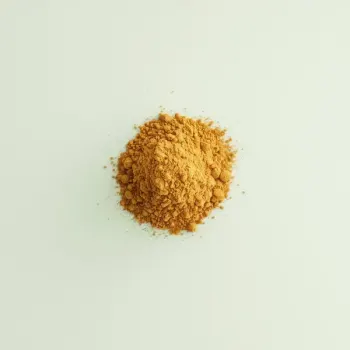Ginger vs Ginger Powder explores the distinct flavors and culinary uses of fresh ginger root and its dried, ground form, highlighting their differences and providing substitution tips for versatile cooking applications.

Ginger is a rhizome, a root-like stem, known for its peppery and slightly sweet flavor, and citrusy aroma. It's commonly used in fresh, minced, or grated form and plays a pivotal role in a wide array of dishes worldwide.

Ginger powder is the ground form of dried ginger root. It offers a more mellow and less piquant flavor compared to its fresh counterpart, making it suitable for a variety of baked goods and spice blends.
Fresh ginger offers a sharp, spicy kick with a hint of sweetness and is juicy in texture, while ginger powder provides a more subtle, earthy warmth. Fresh ginger is sourced directly from the ginger plant, whereas ginger powder is the dried and ground form of the root. These differences affect how each is used in cooking, from the intensity of flavor to the moisture content they add to dishes.

Your ultimate Recipe Box, Meal Planner, and Cooking Class all in one
Fresh ginger is ideal for infusing teas, cocktails, and smoothies with a pungent and refreshing taste. Grate it into your drink for a zesty twist. Ginger powder can be whisked into warm beverages like hot chocolate or golden milk for a cozy, spiced undertone without texture issues.
Minced fresh ginger can be added to batters for moist cakes and muffins, imparting a fresh, vibrant flavor that complements fruits like pear or apple. Ginger powder is a staple in spice cakes, gingerbread, and cookies, offering a warm, uniform flavor that permeates the dough without adding extra moisture.
Fresh ginger is a star in stir-fries, marinades, and sauces, adding a bright, piquant taste that stands up to cooking and complements meats and vegetables. Ginger powder works well in dry rubs, spice mixes, and slow-cooked dishes where its subtle flavor can infuse the meal over time without overpowering other ingredients.
Both forms of ginger offer digestive benefits and contain similar compounds, though fresh ginger may provide more active enzymes and higher levels of certain nutrients.
| Nutrient | Ginger ( Per Teaspoon ) | Ginger Powder ( Per Teaspoon ) |
|---|---|---|
| Fat | 0.01g | 0.07g |
| Sodium | 0.13mg | 1.3mg |
| Protein | 0.04g | 0.18g |
| Calories | 2 | 6 |
| Carbohydrates | 0.36g | 1.35g |
| Dietary Fiber | 0.04g | 0.3g |
Yes, in many recipes ginger powder can be used as a substitute for fresh ginger, but the conversion rate and flavor profile will differ.
Generally, ginger powder has a milder, more subdued flavor than the zesty spiciness of fresh ginger.
While both forms contain beneficial compounds, fresh ginger may retain more of its active enzymes and higher levels of certain nutrients.
Store fresh ginger in the refrigerator and ginger powder in a cool, dry place to maintain their potency and freshness.
Yes, you can dehydrate slices of fresh ginger and then grind them into a powder to make homemade ginger howder.